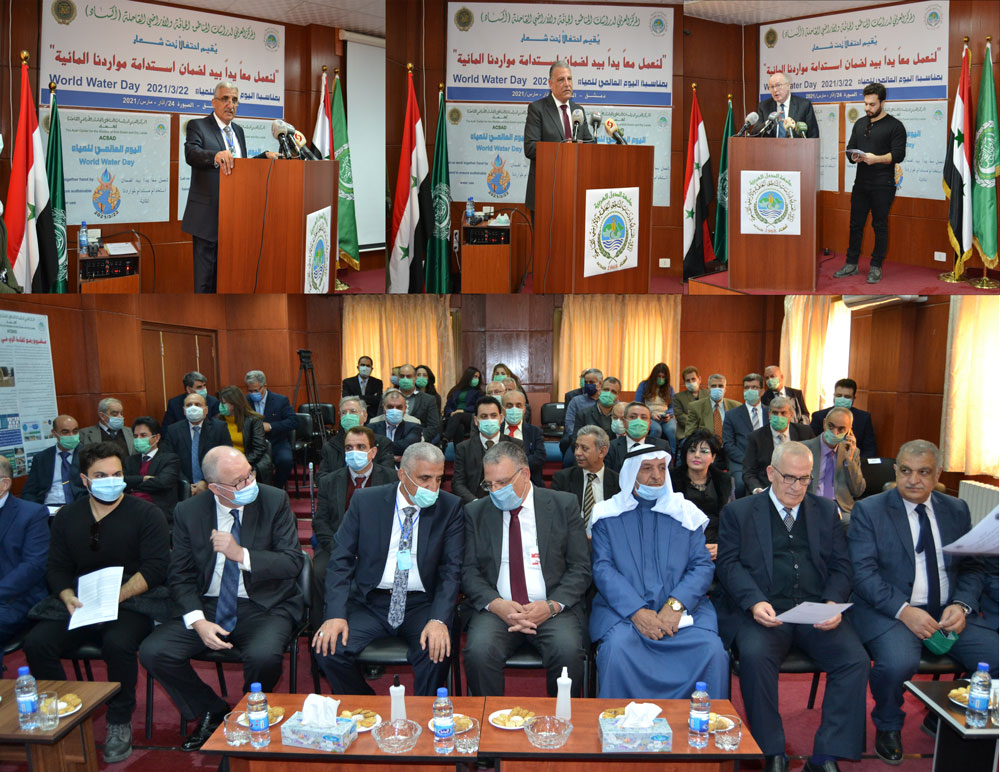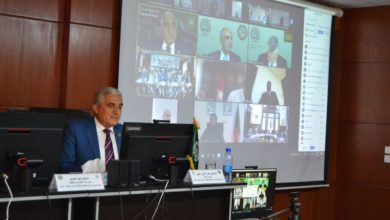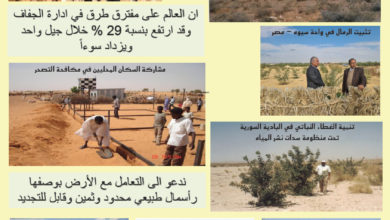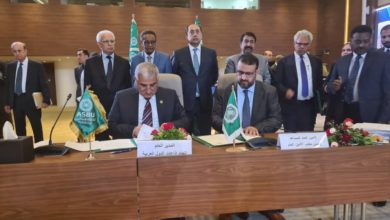World Water Day / Celebration at ACSAD headquarters
In the presence of His Excellency, the Minister of Agriculture and Agrarian Reform, Eng Mohammad Hassan Qatna, Dr. Mike Robenson, the Director of the FAO Office in Damascus, Dr. Majd Jamal, the Associate Director-General of ICARDA, representatives of many management concerned in the Syrian water and agriculture sectors, and turnout of Arab and Syrian experts; the Arab Center for the Studies of Arid Zones and Drylands (ACSAD) held at its headquarters in Damascus today, a ceremonial occasion on “World Water Day,” aiming of raising the awareness of the water’s importance, facing the growing demand for it, exserting more efforts to achieving the sustainable development’s sixth goal which dealing with the issue of access to water availability and the sustainable management of its resources in 2030.
In his address, the Minister of Agriculture highly valued the Arab Center Organization ACSAD’s efforts in preparing for this celebration and coming up with such a decent appearance that reflects the great experience of ACSAD.
The Minister appreciated the serious and fruitful cooperation between the Ministry of Agriculture and ACSAD Organization, especially under its new administration, to reach the joint and desirable goals and ambitions under the severe economic conditions that Syria is going through, as a result of the unjust economic blockade.
He said: “Our projects are extensive and diverse, after the signing of the framework convention with the Arab Center ACSAD Organization,” praising the role played by ACSAD’s experts and their effective participation in the recent forum of the Syrian agriculture sector. He also confirmed that they provided a value-added to the forum through their interventions, through which they transferred their accumulative experiences over all the Arab world.
The Minister also noted the achievements accomplished by ACSAD Organization in the water use management field and raised its use and efficiency, the water projects implemented in Syria and Arab countries, where it was accomplished a very important water-saving through it. He also stressed the pilot role of ACSAD in transferring the applied studies and research results to the farmers` fields, which had a great positive impact in increasing the quantity and quality of productivity in both plant and animal fields; as well as to develop modern technologies for combating desertification and water use that the development agriculture strategy sought for in Syria.
He added that the water resources were an essential utility and substantial supplier affecting the national food security, primarily that 80% of water resources were used for the agricultural sector.
“We must view water resources as a national wealth that should take care of and manage properly, which needs to prominent programs and plans to sustainability and conserve it, application development projects that achieve the most extensive agricultural production with the minor use of these resources.” Said the Minister.
In his part, Dr. Nasr Edin Obaid, His Excellency the Director-General of ACSAD Organization, expressed in his speech that on World Water Day, ACSAD was keen to organize this celebration. Since its establishment, the Organization has paid particular attention to water resources in the Arab region. Where it raised the slogan of “Water security is a strategic response to food security,” and dozens of projects have been implemented in the areas of water resources development, management, and rational use, particularly in the areas of rainwater harvesting, groundwater management, floodwater management, water needs assessment, and improving irrigation efficiency.
Dr. Obaid also pointed out that, based on this leading role for ACSAD, the Arab Ministerial Council for Water, in accordance with the decision of the Arab Economic and Social Summit held in Kuwait in 2009, ACSAD was tasked with the elaboration of the Strategy for Water Security in the Arab Region in cooperation with relevant international and Arab organizations, which laid the foundations for addressing future challenges and requirements for sustainable development goals (2010-2030), particularly its sixth goal.
He clarified that ACSAD had set an example in implementing that strategy, building on it all its actions and projects in the area of water, like the projects of rainwater harvesting in nine Arab countries aiming at providing water for animals, integrated irrigation, and restoring the degraded land; and projects for the use of mathematical models and decision support systems in five Arab countries with the aim of determining groundwater desired areas and the safe drawing which contributed to preserving the groundwater resources and limiting its depletion, the Irrigation efficiency raising Project in 13 Arab countries that identified the real reasons for the decrease in irrigation efficiency and proposed a set of practical actions to improve this efficiency.
Dr. Obaid also noted that ACSAD implemented several projects and studies in the field of climate change, the most important of which was the study project of the climate change in the Arab area and their impacts on water resources (RICAR) that the Organization implemented in collaboration with (ESKWA) and other international organizations. ACSAD also conducted in cooperation with FAO Organization and the German Agency for International Cooperation (GIZ) a study of the climate change effect on the strategic crops and their water needs, and the project of the adaptation with the climate change (akwam) funded by (GIZ) that covered the Arab region as a whole, as well as the climate and water database for Arab region done by ACSAD.
At the end of his speech, Dr. Obaid called all the regional and international organization representatives who participated in this celebration to coordinate and collaborate with the Arab Center Organization ACSAD in the field of water resources conservation, especially in light of the unprecedented global crises by climate change and the Corona pandemic.
In his turn, the FAO office Director in Damascus, Dr. Mike Robenson, reviewed the most important projects implemented in Syria and their role in restoring water installations such as irrigation canals, pumping stations, and technical and financial assistance.
He also expressed his appreciation and gratitude to the Director-General of ACSAD for his visit to the FAO office in Damascus recently, noting the importance of the discussions, confirming his keenness to increasing cooperation with ACSAD, especially under its new administration in the view of providing more assistance to farmers and livestock breeders in Syria.
The Ministry of Agriculture and Agrarian Reform made a presentation on the difficulties facing the Syrian agricultural sector’s development presented by Engineer Raed Hamza, the National Centre for Agricultural Policy Director. The Ministry of Water Resources also made one on Syria’s water resources and its most important problems by Engineer Basil Kamal Edin. In addition to ACSAD’s Presentation on the role of ACSAD in the preparation and implementation of the Arab Water Security Strategy presented by Dr. Ehab Jenad, the Water Resources Department Director in ACSAD.




